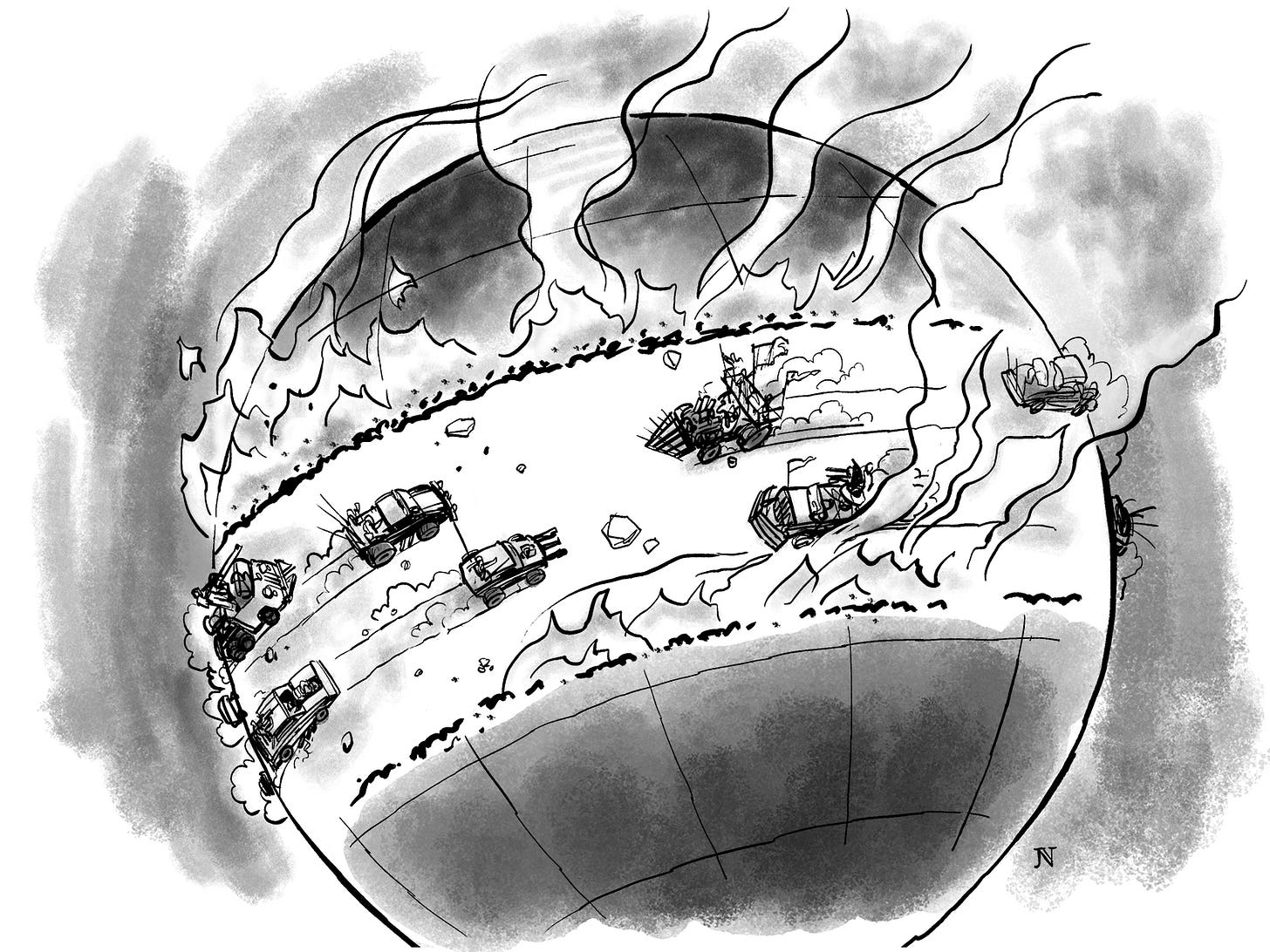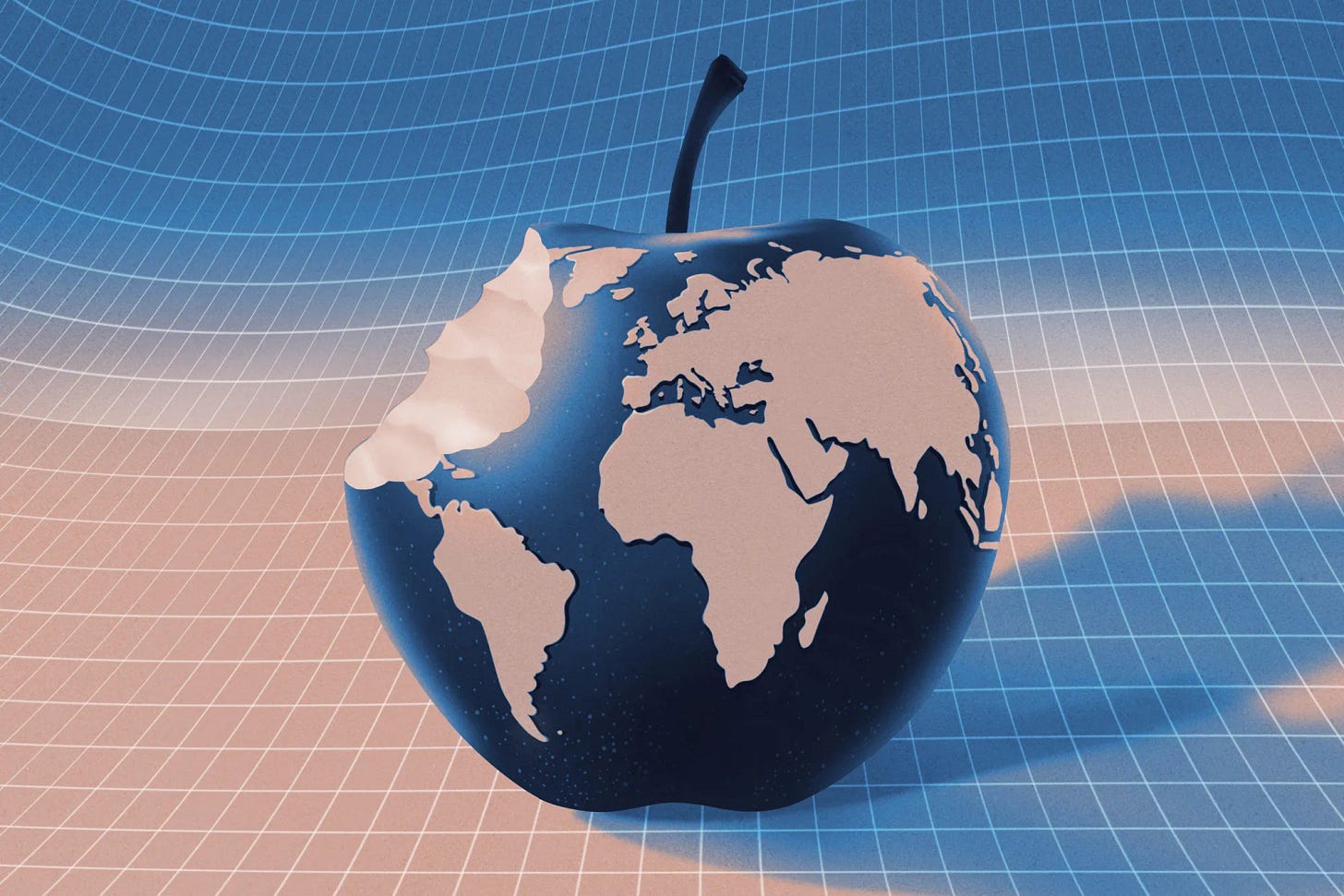Flying to Arizona today — ground zero for this type of future within the United States, so the subject seems apt.
The always-smart David Wallace-Wells kicks us off with Climate Change Is Losing Its Grip on Our Politics — a title one supposes he would have eschewed if Trump had lost the election, but here we are.
Trump’s election may look like a black dawn to climate activists. And indeed it is: When the timelines of climate action are so short, and the paths to climate stability so narrow and difficult, any setback is a disaster. In 2018, considering a world 1.5 degrees warmer than in preindustrial times, the world’s scientists issued an unignorable warning about the consequences; in 2024, according to a Carbon Brief analysis, we have already surpassed 1.5. And now we know, almost surely, that the United States will be leading the world more quickly and belligerently into that danger zone, not helping to chart a way out of it.
There’s abdicating leadership amidst a truly global crisis, and then there’s hurting yourself economically in the process:
On the global stage, Trump’s victory looks like an effective surrender in the green tech arms race with China, which not that long ago formed the cornerstone of America’s new industrial strategy — a confused hodgepodge of geopolitical rivalry and domestic economic repair that promised to restore U.S. manufacturing might and secure an imperial share of the world’s clean-energy future. In China, emissions may have already peaked— a miraculous turn of events that has forced American hawks to present Beijing’s commitment to clean energy, rather than the opposite, as the larger geopolitical problem.
Trust me, no matter what China does in whichever direction on climate change, it’s a national security threat to the United States!
Why?
Just because it is!
We can ask the same question about globalization: What happens when the US truly abandons the global liberal trade order it created?
I’ll tell you what happens: it simply moves on without us, just like the Green Revolution:
Bloomberg Economics’ model of Trump’s proposed tariffs expects that other countries will offset most of their lost trade with the US simply by trading more with each other. That points to the possibility that globalization could keep on humming — just without the US at its center.
A measure of our success, yes, but a marker of our incredibly willfulness: we want the world to change so that we can be great again, refusing to do the things domestically needed for that pathway to actually unfold (columnist Eduardo Porter’s argument covered yesterday in the Cutdown).
Our populist anger is thus greeted with shrugs and mystification by the wider world: such a sad story.
As I argue in America’s New Map:
If America deserves the lion’s share of credit for globalization’s successes, then we must accept similar blame for climate change. The two dynamics cannot be separated, which is probably why America leads the world in climate change denialism. Already stressed by globalization’s competitive pressures, many of us cannot imagine simultaneously leading the world’s response to climate change. The size of the task is simply too intimidating.
Instead of seeing either responsibility (US-style globalization) or competition (China) or opportunity (that increasingly Global South-centric majority middle class), we only see cost — climate change as a “shakedown” of the North by the South.
Fine, if that’s how you need to convince yourself that you lack any such responsibility, but the only way you can square that circular logic is to radically embrace the Green Revolution, driving down its prices, as Bjorn Lomborg argues, so that the Global South can leapfrog that energy transition.
But, with Trump, we won’t get that. We get the “hoax” and the “shakedown” logic and the drill, baby, drill! — all off-ramps from reality.
Some hope? The Biden Administration shoving as much of the Inflation Reduction Act’s money out of the door before inauguration. Why? Something like three-quarters of that funding is going to districts just carried by the GOP.
Meanwhile, the reports of climate-related deaths are looking less like exaggerations and more like permanent trajectories. World Weather Attribution’s recent report spells it out:
Human-caused climate change intensified all of the 10 deadliest extreme weather events of the last 20 years and contributed to more than 570,000 deaths.
That is what a 1.3 degree Celsius (to-date) temp rise has wrought, with 2024 likely to end as our first true year hitting the dreaded 1.5 degree threshold we’ve heard so much about.
We are just beginning to understand the future we have in-store:
Dr Sjoukje Philip, Researcher at the Royal Netherlands Meteorological Institute, said:
“At the turn of the century, climate change was often thought of as a faraway, distant threat.
“But today, we have 20 years of attribution science directly linking climate change with record-breaking heatwaves, droughts, wildfires, and storms.
“The body of evidence linking extreme weather to climate change will continue to grow as the climate continues to warm and we develop more attribution methods.”
The way ahead if far from mysterious — in addition to being far-from impoverishing for those who embrace the challenge:
Dr Friederike Otto, Senior Lecturer at the Centre for Environmental Policy, Imperial College London, said:
“Tackling climate change isn’t about targets or reports or global meetings – it is about people.
“The poorest, most vulnerable people suffer the most in extreme weather events worsened by climate change.
“We have the technology and knowledge to replace fossil fuels with renewable energy, lower demand and build a safer, healthier world. But, we need political leaders to step up and make it happen.”
Instead we have these dueling races in which — year after year — the world collectively achieves the hottest year on record AND the greatest flow of CO2 into the atmosphere.
Talk about digging a hole.
And then we wonder why famine is returning to major portions of Africa, where it gets harder and harder to grow food every year because of climate change.
Over 16 million people in Malawi, Zambia, and Zimbabwe are grappling with escalating food crises as inflation, droughts, and economic instability, deepening food insecurity across Southern Africa. The livelihoods and well-being of women, girls, and children are especially at severe risk as access to nutritious food and essential services becomes increasingly strained. These include far-reaching impacts on education – hunger leads to severe challenges focusing at school – and safety – women and girls must travel even further in search of clean drinking water for their families.
“The food crisis in Southern Africa is reaching unprecedented levels, leaving millions on the brink of survival,” said Patrick Sikana, CARE Southern Africa Regional Director.
This is literally a women-and-children-first situation when it comes to offering lifeboats, but America is choosing otherwise.
We’re not playing the heroes here but the villains.
“The devastating toll of climate change on women and girls in Southern Africa cannot be overstated,” said Patrick Sikana. “We are at a critical moment for action—one that calls for an immediate, compassionate response and an unwavering commitment to solutions that truly last. The humanitarian needs are urgent, and we must not delay in channeling resources, executing robust response plans, and engaging communities at every level. If we do not act quickly and deeply enough, a vicious circle of hunger, poverty, and climate change will emerge and consign entire communities to endless suffering. To build resilience that endures, we need to invest in disaster prevention, early warning systems, and climate strategies that are inclusive of all voices. Women-led organizations, deeply rooted in their communities, understand the unique, complex challenges these women and girls face and are the best hope for shaping solutions that work. Their strength, knowledge, and courage are vital to creating a fair and sustainable future—one where everyone can thrive.”
America wants to be great again, I get it. It’s just that our path to greatness right now is far different today than it was last century. We just remain unable to see the situation for what it is, instead couching everything in Cold War memes (Containment! World War III!) because that’s all our aging political leadership knows — and it’s maddening, because the strategic opportunities and responsibilities lie clearly in front of us, or at least before our younger generations who grow more anxious by the day.
From ANM:
Climate change already redefines our sense of what is conceivable and inconceivable within our lifetimes. The Anthropocene beckons. We should pay attention less out of the threat generated than out of the opportunities afforded, because we will live in a far different world located on the far side of this transformation.
Powers both great and small will be forced to try all sorts of economic, security, and political schemes to avoid, or at least mitigate, Middle Earth’s depopulation over this century. If Northern states want to avoid uncontrollable migrant flows, then we need to construct and extend channels of aid and investment designed to expand social resiliency across Middle Earth. We can attempt that primarily as intervening external powers, but that limits our ability to make sure money and resources are well spent, yielding downstream success—and profits. We are likely to do better when we formally link those capacity-building efforts with those states’ progress toward deeper membership in shared economic and political unions. That promised extension of economic security by superpowers will constitute the twenty-first-century equivalent of a nuclear umbrella—as in, step under our protection and plan your economic future with confidence. This is essentially the EU’s “carrot” of accession and what China promises with its Belt and Road Initiative, which, despite Western criticism, consistently delivers local economic growth among its lower-income partner states.
America cannot compete without a similar offering, meaning we picked the worst possible moment to go all nativist.
The worst moment, indeed.
Keep reading with a 7-day free trial
Subscribe to Thomas P.M. Barnett’s Global Throughlines to keep reading this post and get 7 days of free access to the full post archives.





